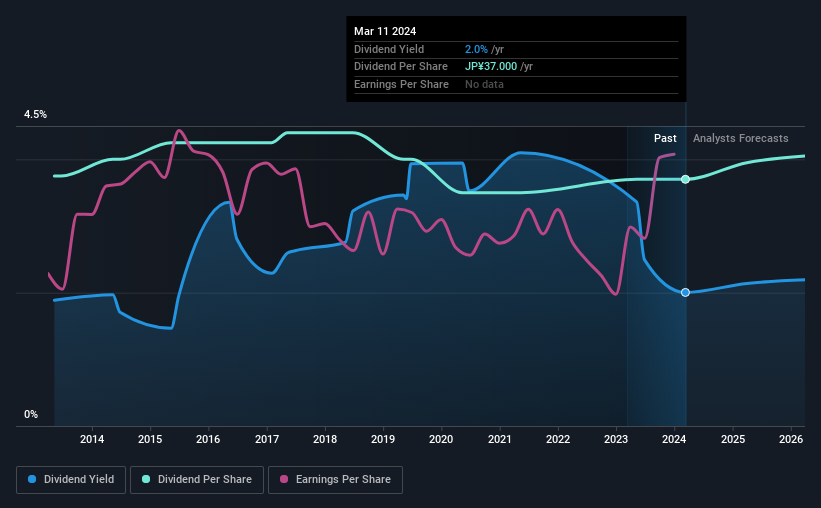
Hokuhoku Financial Group, Inc. (TSE:8377) will pay a dividend of ¥37.00 on the 28th of June. Including this payment, the dividend yield on the stock will be 2.0%, which is a modest boost for shareholders' returns.
View our latest analysis for Hokuhoku Financial Group
Hokuhoku Financial Group's Dividend Forecasted To Be Well Covered By Earnings
If it is predictable over a long period, even low dividend yields can be attractive.
Having distributed dividends for at least 10 years, Hokuhoku Financial Group has a long history of paying out a part of its earnings to shareholders. While past records don't necessarily translate into future results, the company's payout ratio of 17% also shows that Hokuhoku Financial Group is able to comfortably pay dividends.
Over the next year, EPS is forecast to fall by 20.3%. But assuming the dividend continues along recent trends, we believe the future payout ratio could be 21%, which we are pretty comfortable with and we think would be feasible on an earnings basis.

Hokuhoku Financial Group Has A Solid Track Record
The company has a sustained record of paying dividends with very little fluctuation. Since 2014, the annual payment back then was ¥37.50, compared to the most recent full-year payment of ¥37.00. Dividend payments have shrunk at a rate of less than 1% per annum over this time frame. Declining dividends isn't generally what we look for as they can indicate that the company is running into some challenges.
We Could See Hokuhoku Financial Group's Dividend Growing
Investors who have held shares in the company for the past few years will be happy with the dividend income they have received. Hokuhoku Financial Group has impressed us by growing EPS at 9.9% per year over the past five years. A low payout ratio and decent growth suggests that the company is reinvesting well, and it also has plenty of room to increase the dividend over time.
Hokuhoku Financial Group Looks Like A Great Dividend Stock
Overall, we think that this is a great income investment, and we think that maintaining the dividend this year may have been a conservative choice. The earnings easily cover the company's distributions, and the company is generating plenty of cash. We should point out that the earnings are expected to fall over the next 12 months, which won't be a problem if this doesn't become a trend, but could cause some turbulence in the next year. All in all, this checks a lot of the boxes we look for when choosing an income stock.
It's important to note that companies having a consistent dividend policy will generate greater investor confidence than those having an erratic one. However, there are other things to consider for investors when analysing stock performance. As an example, we've identified 1 warning sign for Hokuhoku Financial Group that you should be aware of before investing. Looking for more high-yielding dividend ideas? Try our collection of strong dividend payers.
If you're looking to trade Hokuhoku Financial Group, open an account with the lowest-cost platform trusted by professionals, Interactive Brokers.
With clients in over 200 countries and territories, and access to 160 markets, IBKR lets you trade stocks, options, futures, forex, bonds and funds from a single integrated account.
Enjoy no hidden fees, no account minimums, and FX conversion rates as low as 0.03%, far better than what most brokers offer.
Sponsored ContentValuation is complex, but we're here to simplify it.
Discover if Hokuhoku Financial Group might be undervalued or overvalued with our detailed analysis, featuring fair value estimates, potential risks, dividends, insider trades, and its financial condition.
Access Free AnalysisHave feedback on this article? Concerned about the content? Get in touch with us directly. Alternatively, email editorial-team (at) simplywallst.com.
This article by Simply Wall St is general in nature. We provide commentary based on historical data and analyst forecasts only using an unbiased methodology and our articles are not intended to be financial advice. It does not constitute a recommendation to buy or sell any stock, and does not take account of your objectives, or your financial situation. We aim to bring you long-term focused analysis driven by fundamental data. Note that our analysis may not factor in the latest price-sensitive company announcements or qualitative material. Simply Wall St has no position in any stocks mentioned.
About TSE:8377
Hokuhoku Financial Group
Through its subsidiaries, provides various banking products and services to individuals, and small and medium-sized enterprises.
Solid track record with mediocre balance sheet.
Similar Companies
Market Insights
Community Narratives




